Venison with Cumberland Sauce
December 16, 2012 | Updated June 06, 2022
As an Amazon Associate I earn from qualifying purchases.
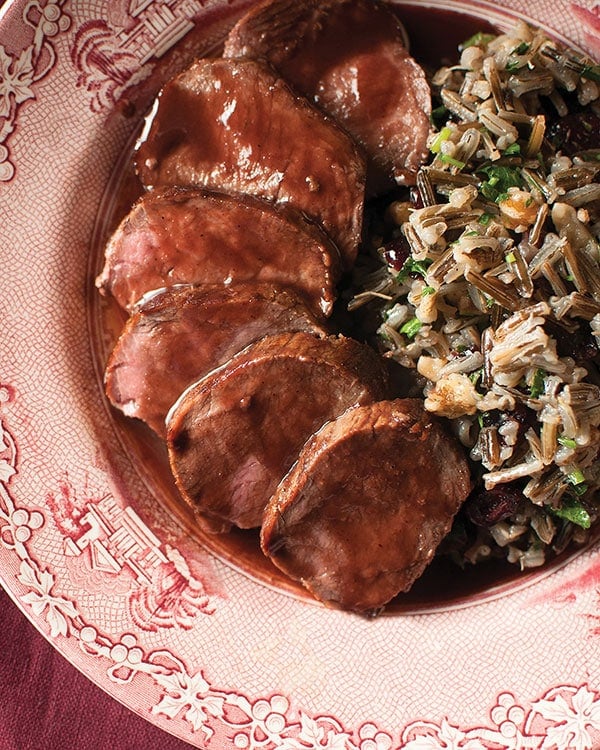
If there is a classic way to eat venison, Cumberland sauce is it.
Venison backstrap, seared medium-rare and served with Cumberland sauce, which hinges on the tart-and-sweet red currant, is perhaps the oldest wild game sauce still commonly made today. It dates from at least the 1700s, and has been modified only a little since then.
The great food writer Jane Grigson, in her Fruit Book, writes that the first real reference to a Cumberland-like sauce is in Hannah Glasse’s 1747 cookbook, The Art of Cookery Made Plain and Easy. Glasse’s version of the sauce includes red currants, red wine, sugar and red wine vinegar; it’s basically a modern gastrique. The addition of Port wine and meat stock to the sauce arrives by 1817, and the sauce as we know it now — with the addition of mustard and citrus — is fully formed by 1846.
What’s the big deal about Cumberland sauce, and why should it persist so long in our kitchens? Because it is a perfect balance of sweet, spicy, savory and salty. Whenever you achieve this balance in cooking, people will remember you… or at least your food. A good barbecue sauce hits all these notes, as does all proper Vietnamese food.
And while there is no one true recipe for Cumberland, it always has at least the following:
- Red currants, either in jelly or syrup or as whole fruits. You can substitute other tart red fruit, however, and I’ve used cranberries, highbush cranberries, lingonberries and even raspberries with good results.
- Red wine or Port. No substitute, so if you cannot use alcohol in your cooking, you are out of luck. You can make a facsimile of Cumberland without wine, but it will not be the same sauce.
- Citrus. Most recipes have either lemon or orange zest plus some juice, too. If you can ever get your hands on bitter Seville oranges, they are what was historically used.
- Meat stock. As we just saw, the oldest versions of Cumberland don’t have this, but the addition of meat stock — especially demi-glace or glace de viande – adds a lot to the flavor. If you don’t have demi, use regular stock and boil it down. Only be very careful about any other salt in the sauce, as the boiled-down stock will get very salty.
- Spices. English dry mustard (Coleman’s) is almost always used, and so is freshly ground black pepper. And I mean freshly ground: It makes a difference in this case, as black pepper is one of the primary flavors in this sauce. A lot of recipes also add a pinch of cayenne pepper. This might sound modern, but keep in mind that cayenne starts appearing in European food as early as the 1600s. The iconic French chef Auguste Escoffier added ground ginger to his version of Cumberland.
You can certainly make Cumberland sauce on the side, or you can do as I do and make it as a pan sauce when you are done cooking. I prefer this method because it takes advantage of the browned bits in the saute pan and uses fewer pots, which means less to clean up afterwards.
This sauce is also perfect for pan-seared venison tenderloin, but you need not restrict yourself to venison here. Cumberland has been used for hare, lamb, duck and goose since it was invented. It is one of my all-time favorite sauces for a simply seared duck breast, wild or domestic.
What goes well with Cumberland on the plate? I like simple mashed potatoes, but boiled or baked potatoes are just as good. Polenta or fried hominy is excellent, as would any other mashed root vegetable. Or go simple and just serve it with a green salad and some nice, crusty bread.
I have several similarly classic wild game sauces that work well with venison, like venison medallions with gin and juniper, and the venerable steak Diane.
Venison Backstrap with Cumberland Sauce
Ingredients
VENISON
- 1 to 1/2 pounds venison backstrap, in one piece
- Salt
- 3 tablespoons unsalted butter, duck fat or cooking oil
CUMBERLAND SAUCE
- 1 shallot, minced
- 1/2 cup Port wine
- 1/4 cup Demi-glace, or 1 cup regular stock
- A pinch of salt
- 1/2 teaspoon dry mustard
- 1/4 teaspoon cayenne
- Zest of a lemon and an orange
- 1/4 cup Red currant jelly
- Freshly ground black pepper
Instructions
- Take the venison out of the fridge and salt it well. Let it rest at room temperature for 30 minutes.
- Melt the butter in a saute pan large enough to hold the venison backstrap over medium-high heat. When it's hot, turn the heat down to medium and brown the venison on all sides. Use the finger test for doneness to cook the meat to the level you want. I prefer medium-rare. Remember it will continue to cook as it rests, so take it out a little before it reaches the doneness you want. Move the meat to a cutting board, tent loosely with foil and let it rest while you make the sauce.
- When your meat has come out of the pan, make sure there is at least 1 tablespoon of butter or oil in it. If not, add more. Saute the shallot over medium-high heat for 90 seconds, just until it softens. Don't let it burn.
- Add the Port wine and use a wooden spoon to scrape up any browned bits stuck to the pan. Let this boil furiously until it is reduced by half. Add the demi-glace (or stock), the salt, citrus zest, mustard and cayenne and let this boil for a minute or two. Stir in the red currant jelly and the black pepper. Let all this boil down until it is thick, but still pourable. You can strain it if you want a more refined sauce.
- Slice the venison into medallions. Pour any juices that have come out of the meat into the sauce and stir to combine. Serve with the sauce either over the meat or alongside.
Notes
Nutrition
Nutrition information is automatically calculated, so should only be used as an approximation.
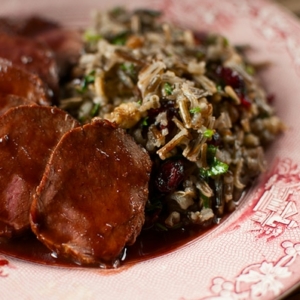
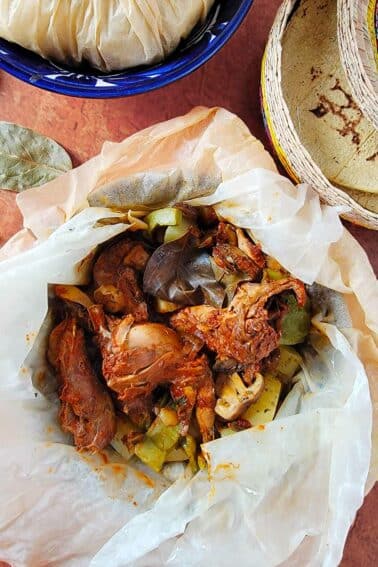
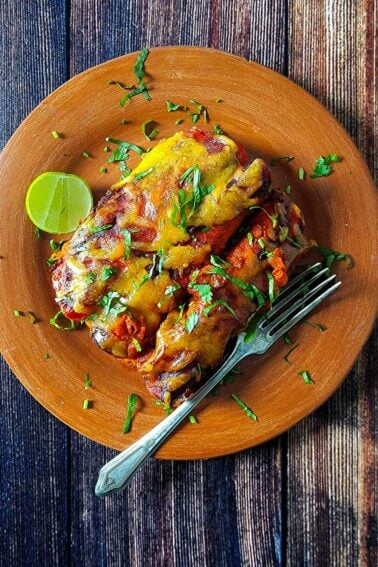
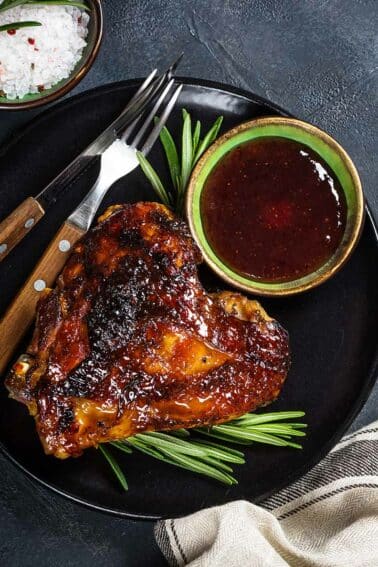
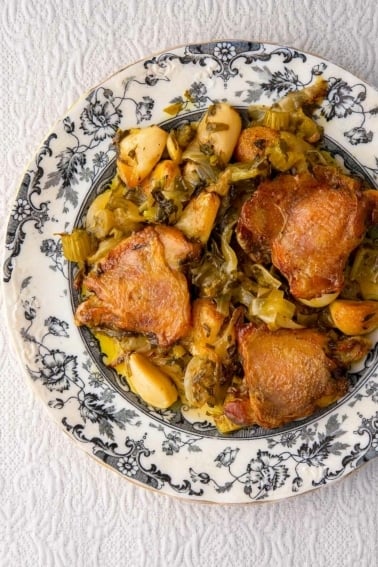
Thanks. Never made venison tenderloin before, read and made your recipe on searing the tenderloin then added the Cumberland sauce.
(Made mine medium, should have stayed at medium rare.)
Thanks
Made this with crabapple jelly, as that is what I had on hand. Poured over elk tenderloins. Delicious, and now the most requested Sunday dinner sauce.
*Buck, Buck, Moose
Hank, your recipes are always créme de la créme; Buck, Buck, Deer is my go-to. You or someone else may have suggested this, and I didn’t read it, but Christmas Day on impulse I trussed together two complementary 16″ lengths of whitetail backstrap to make one thicker “loin,” and grilled it to medium rare, making a very nice dish more approximating the size of a beef tenderloin. Wonderful!
I made this for an elegant Valentine’s Day dinner exactly as written. I reduced low sodium chicken broth as noted in “Buck, Buck Moose” and used it instead of the demi glace. It was spectacular. Served with mushroom risotto, but now I wish I’d made polenta. Now I have to figure out what to do with the rest of the bottle of port!
Worth making with black currants? I’ve no reds and more blacks than I can shake a currant bush at.
Dave: Absolutely. Not traditional, but tasty. I have a black currant sauce for venison in my book Buck Buck Moose, actually.
Great recipe! Used the finger method for checking for doneness. Worked like a charm. I’ve come to rely on Hank’s recipes for all game cooking in the house! Thanks!
Jan Lee
Someone gave me a jar of wild lingonberry sauce, would this recipe be a good one to substitute or is there another recipe in buck buck moose you’d recommend ?
Dreaming of buck buck moose 2.0 for those of us with no creativity.
Lou: Yep, it will be perfect with this recipe!
Most of the time we just salt and sear our deer steaks, but every now and then, I like to mix it up and do something special. This is fantastic, and part of our regular rotation.
I saw on your elderberry syrup recipe that you can use it for this sauce. How would I go about doing that? Do I just replace the red currant jelly with the elderberry syrup?
Jonathan: Yes.
We just had this recipe with some venison tenderloin that I harvested in Minnesota in November. In our small southern city I could not find red current jam. I chose to use cranberry sauce (out of the can, because my wife did not make from scratch this year.) It came out very well. Used half sweet vermouth and half whatever red was open. Thank you for the recipe. Bill
Worth the effort, and worth tracking down the currant jelly!
I made this with Lingonberries and it was wonderful.
I made this with duck breast. The sauce was way too sweet and I followed the recipe to the letter. It might pair better with a stronger tasting meat but it overpowered my duck..
Yes the red currant jelly flavor flavor in the Cumberland Sauce counters the gamey flavor present in venison, lamb, or dove breastc but definitely overpowers the delicate flavor of duck breast, especially if the duck is domestic.
Absolutely amazing recipe! My nephew sent me a back strap venison and I used your recipe as written (firmly believe in trying original recipe before thinking of substitutions).
My husband and I devoured the entire back strap, sauce along with garlic mashed potatoes, green garden salad and a bottle of syrah?
Amazing !!!
Outstanding way to step up the backstrap game!!! Everyone loved it.
Made this Christmas eve, only change was using half port and half red wine. It was excellent, served with rack of lamb and it was really good. Letting it sit a little while before serving really brought out the citrus flavour which was really nice.